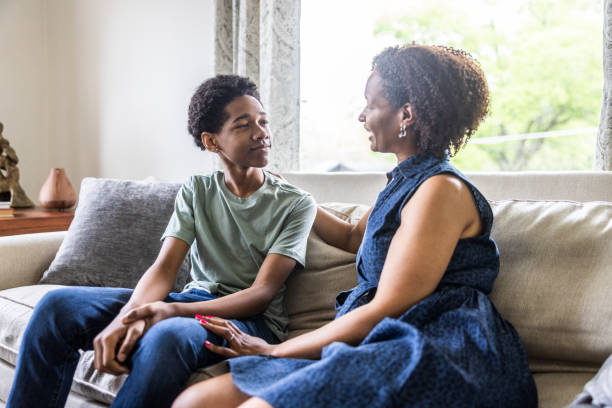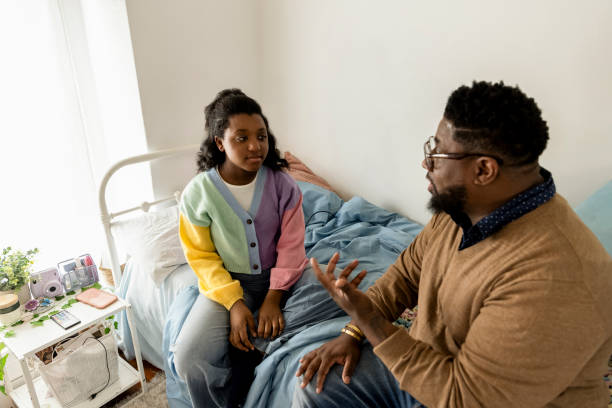
Many parents wish they could avoid talking about sex with their kids because it can feel awkward – especially if you’re not sure what to cover. Having that talk is even more important for Black parents as Black American teens face different obstacles than other ethnicities. Fortunately, it’s easier to talk to your teen about sex when you know where to start.
Why Black Teens Need the Talk
Any parent will be concerned about their teens contracting sexually transmitted infections (STIs) or dealing with an unplanned pregnancy. According to the National Library of Medicine (NLM), Black people between the ages of 13 and 24 have the highest rates of contracting chlamydia, syphilis, and gonorrhea. The numbers also show that female teens are more likely to contract STIs than males. Additionally, Black teens have a higher rate of pregnancy.
This information is even more daunting when you consider the lack of support that Black teens typically have. Numerous studies show that there is a bias that still plagues the medical community when it comes to Black Americans. Since they are regarded as being naturally sexually promiscuous, Black teens may not get the sex education they need or counsel about contraceptives. As a result, they’re more likely to partake in risky sexual behaviors.
8 Tips for Having the Sex Talk
1. Include the Opposite Sex if Possible
It’s typical to expect that the sex talk will come from the parent or guardian of the same sex. However, experts say that including someone of the opposite sex works to remove some of the embarrassment that is associated with talking about sex. It also shows that both of you are on the same page.
2. Start Honestly
If you’ve never talked to your child about sex, it’s helpful to admit that you’d like to change that because it’s important. Acknowledging that shows your child that things are going to change and encourages them to share their thoughts with you.
3. Be Open
While talking to your child, they’ll likely have questions about your experiences. You don’t have to share all the details but being open helps to build communication. It’s good for your child to see that you’re willing to talk about what interests them.
4. Take it Seriously
You may be tempted to joke around or use silly words to describe body parts but the experts advise against that. It’s better to use the correct terms for everything to emphasize that this is a serious conversation.
5. Be Patient
Some parents want to get the conversation over with as quickly as possible because it’s awkward. If you rush things, though, it gives your child the impression that what they have to say isn’t important. They’ll think that you only want to say your piece and run away. If that happens, it’s unlikely that they’ll listen to you or absorb what you’ve said.

6. Expect Questions
If you’ve started the conversation well, your teen will have a lot of questions. You should answer them as honestly as you can but don’t be afraid to admit when you need to do a little research. Your admission and follow-up will show them that they can trust you.
7. Tailor Your Talk to Your Child
Apart from giving them black-and-white information about sex, it’s good to incorporate things that will specifically benefit your child. For example, while everyone should learn about consent, some children have trouble understanding nuance in conversation, body language, and social cues. If this applies to your teen, you should address that as well.
8. Establish Continued Communication
Having a conversation about sex is only the beginning. As your teen has new experiences, you want them to know that they can talk to you about anything. Continuing to talk about sex-related matters makes it more likely that your teen will tell you when they need your advice about a situation they’re facing.
What Teens May Already Know
Even if you haven’t talked to your teen about sex, they may learn a little about it, anyway. They may have learned about body parts at the preschool level and how babies are made when they’re tweens. As they move into their teens, though, the amount of information your child is exposed to increases exponentially because they’re listening to their peers. At this age, they’re also more likely to look up things online. Unfortunately, these searches can yield accurate and inaccurate results. Given that Black children can become sexually active as young as 12, it’s essential that you guide your child to the right information.
Some of the things they may have asked questions about as teens include sexual attraction, sex positions, contraceptives, birth control, pregnancy, and STIs. Of course, that doesn’t mean they got the right answers so you can’t take it for granted that they already know everything.
It can be tricky to talk to your teen about sex if you’ve never brought the topic up before. However, every Black parent needs to have that talk with their kids because of what’s at risk if they don’t. The tips here should help you to have that important conversation.









